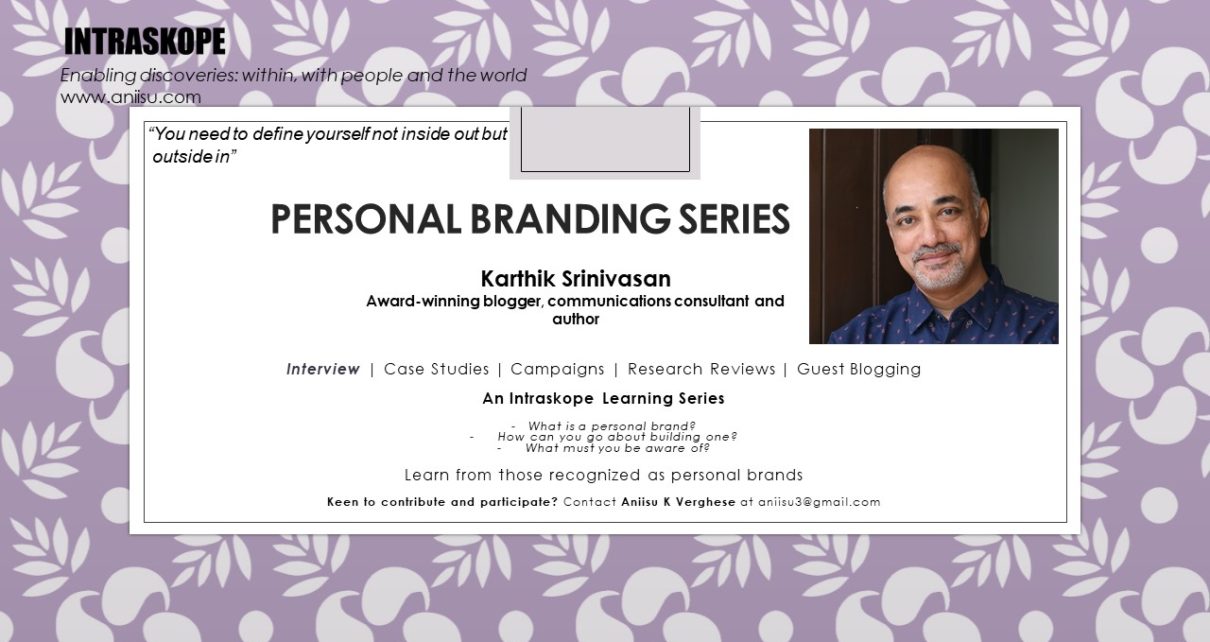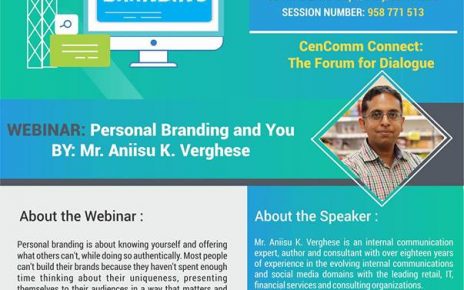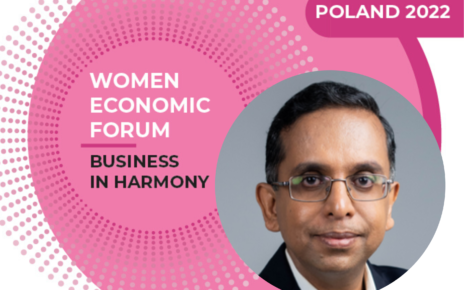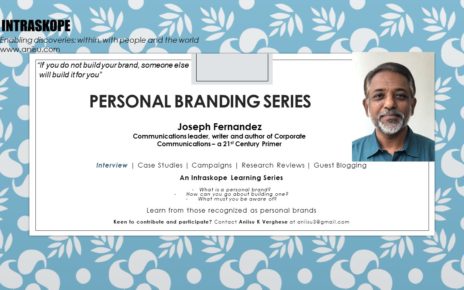Personal branding is a conscious act – much like a performance. Define what you want to be and then stick to your goals.
What are the ways to sharpen your thinking? How can you continue investing in your personal brand? Must you react to every skeptic or critic out there? In the 5th episode of the Personal Branding Series I am delighted to present Karthik Srinivasan’s thoughts. He is an award-winning blogger, communications professional, Linkedin Power Profile (2015-18), and author of a book on personal branding, Be Social, published by Amazon Westland. Karthik and I have known each other for many years, and I have followed his career trajectory while he did stints at Ogilvy and Flipkart and when he charted his own path as a consultant.
Read the interview below and look up the YouTube video interview. Look up more such stories on my YouTube channel and on LinkedIn.
- What according to you is personal branding?
Let me first start by sharing what it is not. It is not a rate card for influencers to decide how much to get paid for tweets. Unlike what people think, it is your personal reputation. As Jeff Bezos says, it is what people talk about you, when you leave the room. The only thing you can control is your personal reputation although it is intangible.
2. Do you consider yourself a personal brand? How do you know it?
Personal brands aren’t easily quantifiable. It does have value, but you only know the value when you try out something. For example, if there is an influencer and you pay an amount X for them to promote a brand and then you know the media works. However, when you are vocal about the work you do and when journalists frame a story, and they reach out to you, you know your personal brand has merit.
3. What does one do to go about building a personal brand?
For the first decade, I had built my brand on a topic completely unrelated to my profession – on music, music reviews and music plagiarism. I have been blogging on music and those topics for the past 15-20 years. The fact is that I have absolutely zero training in music, no formal training of any instrument whatsoever. I was curious and passionately interested in music was that the only calling card I had. Now it is not passion and curiosity alone but a bank of views and opinions, which I put together online for 20 years. That also adds to the reputation – that this person says he has no training but he seems so passionate that there is a 20 year body of work. They go back and check and there is indeed this work. He must be really interested! It meant that people noticed my passion although I never consciously thought of building a personal brand for myself.
When I started blogging on topics associated with my day job (communications), that blog was literally leaning towards – “I want to quit full-time employment at some point”. I wanted to be on my own. I started blogging, very regularly – 5 posts a week. I use Twitter and LinkedIn to talk about communications, marketing and social media related domains. In the last 5 years or so, I felt I needed to have an active engagement out of my full-time employment and therefore invested more on blogging.
4. What are the attributes of a personal brand?
Let’s for once set aside the personal brand. Take this phone for example, OnePlus, as a brand. If I ask you what a OnePlus phone is good for – if you ask a user or if someone has seen an ad, they might say it is a reliable phone, it is dependable, and the battery life is good etc. It is not an extraordinary phone. It won’t let you down. It is also not expensive nor cheap – a mid-range phone. The users know all of this, but it is a conscious communication about the brand. This has been hammered into the minds of the consumers and prospective buyers through multiple media – press, campaigns and other touch points. The same thing – you use it for your personal brand. Start with – what do you want people to know about you? If people had only 5 to 10 seconds of their life to spend on you, which is the time they spent on your bio on Twitter or LinkedIn, in that time frame what would you want people to credibly know about you?
They’d think, “He says this about himself, but is there a way he can get it proved?”
Here is a link or two and he is blogging for 10 years… so that is a starting point and that is what everybody needs to build and that’s what I want to be known for – I generally speak on a few topics which are all connected – communications, marketing, PR etc. The more I do, more people come to assume about my interests.
There are three steps – Define, Demonstrate and Defend. You need to define yourself not inside out but outside in. If you want people to know about you if they had only 10 seconds of their life and then try to match it with what can you offer. Suppose, for instance, if you want to say that I want people to know me as a great traveler and you’re not interested in traveling at all, there is no match at all. Then there is no point.
But if you are good at say, communications and people see that you know a lot in that space, then you have something to offer and differentiate yourself. Don’t stick to one narrow field but go broader.
Under Demonstrate, you need to keep doing what you do well over time, repeatedly using various kinds of formats – be it blogs, tweet, Instagram posts etc. I would think 10X reading is needed to get 1X of views out. The more you know the more you can know.
Defend is about poking skeptics, getting into the arguments or conversations, putting your perspectives and coherently forming an opinion on you reactively.
5. Based on your observations and learning who according to you is a personal brand? What characteristics do you admire about them?
The name I can call out is Anand Mahindra. As a CEO he is a brand already. But he is one of the few CXOs who has a legendary following on Twitter. Why is he the only one? He has been non-conventional in his approach and is known both offline and online. Another personal brand is Krish Ashok from Chennai who works at TCS but recently got a book deal with Penguin. He is not a professional chef but is passionate about cooking and it helped land him the deal. He is a fantastic example of personal branding. Other examples include Diptakirti Chaudhuri who is the head of Marketing at Manipal.
6. What steps did you take to build your brand? How do you know it is working?
For me, in the Define stage I sat down for a week to write down what I wanted to do and be. If they Google me online, what should people take away? It was a conscious act – like a performance but not in a bad way – more calibrated. When you want to say something, and it doesn’t add up, it comes across as artificial. Build a reading list is also extremely important and I commit to 1-2 hours of reading every day, across various points of the day. If you won’t keep yourself refreshed, it will come in the way of building your brand.
7. What challenges did you face while building a personal brand?
The challenges are not external. I believe they are internal to us. We all have 24 hours. Reading is a luxury and time is the biggest asset. It is easy to watch Netflix and waste it all, Or you can build your reading list and be updated on things that matter to your personal brand. I use RSS feeds for blog updates and make a list of online publications to follow. That reduces the time I spend searching for relevant content. I spend time reading 5-6 newspapers –print and online end-to-end. It is not just the headlines. It takes me time per newspaper and it is enormously useful and helps me connect the dots.
8. What did you gain in the process? What did you lose?
On what I gained – when you are putting the effort, you can test out if you are gaining or not. On losing – when I prioritize this over other things like family time etc. It doesn’t feel like a loss since it I am not sitting and reading for 8 hours a day. I have learnt to compartmentalize time. For example, you can wake up early and for two hours try to complete your reading, then that works. Or, some people go for a run or go to a gym in the morning and avoid times when you are not your best. So, you need to pick your time. You can think of it as a mental gym – what we are trying to do. If you want an empty gym, then you need to go in the morning when there will be less people.
About making enemies and skeptics, they are not enemies at all, since you hardly know them, and they hardly know you! They only think they know you because of what they read from you about yourself. You are making them think about how they should think about you, based on what you say online. To actually know a person, you need to live or work with the person! Otherwise, it is just a thought that you know the person! You are curating your life in a way that people form an opinion about you. Which is very different from living a life 24/7 on a stream of video. But, in this case, it is a controlled way of making people see you. I wouldn’t call them skeptics at all. They are just people on the road!
9. How can someone starting from scratch build a personal brand? What is the first step he or she must take?
First is to define what you want to be known for. Most people miss that out and jump into Twitter and LinkedIn saying “let me say something today and get a lot of likes”. Getting a lot of likes isn’t a big deal at all. How you build that over a period of time is what really matters. Consistency matters. It isn’t one post that matters. It is a series of posts over many, many months that matters. That definition goes a long way to help you decide what you should you say and how you should you say online, how often should we say it and why should we say it. That is almost like getting the metrics right. If you don’t get the brand architecture of who you are right, then you will be talking of 100 different things to people who won’t be able to get a handle of who you are. Get the focus and definition of what your brand tenets are and then stick to it.
10. If you had the opportunity to change something about the way you built your personal brand, what would that be?
I would use videos more often! I wasn’t very tuned to videos and I wasn’t an Instagram person. Instagram forces you to think photos first and text later. I am still a ‘text’ first person, not a photo-first person. Not very comfortable with video yet, not something natural that comes to me, But I can change. I joined Instagram very recently. I believe in choosing words carefully and articulating them. For video, that means I have to write a script and then shoot a video, which is twice the effort. When I write a blog, it is just in one form and people can read it their own voice in their own head. I however do understand that video is extremely powerful these days.
11. What is your recipe for personal branding success?
Make it into a habit, every day. If you think I will do this once a week or a fortnight or when I get time, it will never happen. Which means reading, sharing opinions as often as possible (without spamming people)…it has to be done at the right time. Then reflect on what people are sharing as feedback. For instance, LinkedIn is one platform where you can enter into sane conversations on good topics. It doesn’t happen on Instagram and it rarely happens on Twitter. LinkedIn allows for to and fro of conversations. I get a lot of comments and make an attempt to respond to as much as I can and expand my thoughts. They will have a different point of view, which may not be wrong, but it is a different way to think.
12. In times of crisis like COVID19, how must people view building their personal brands?
If you look at my content since the first lockdown was announced, like the Janata Curfew..I am not speaking of ‘normal’ topics that I would have spoken of if there was no pandemic at all. Everything that I’m speaking of on LinkedIn and other channels is all about what we are doing when we go through this crisis together. That is the collective new ‘normal’ because we are all in this together. If I talk of something outside this purview, it sounds awkward. It sounds as if I am in a position of privilege and it hardly makes sense for people who are reading the content. It is rooted in what we are going through everyday; within the purview of what we have defined for myself.
Liked this interview? Please do share your feedback and comments.
Keen to get ahead with your personal brand? Here are some resources:
- Take a FREE assessment on personal branding.
- Refer to the 3C model on Personal Branding
- Sign up for a 60 minute personalized chat on personal branding
- Personal branding for corporate communicators
Missed the earlier episodes? Read the interviews with Muqbil Ahmar, Tinu Cherian Abraham, Joseph Fernandez and Christina Daniels online and share your thoughts.
Keen to join this Series and share your thoughts on Personal Branding? Write to me at [email protected]
Please subscribe to my YouTube Channel and follow me on Medium.



